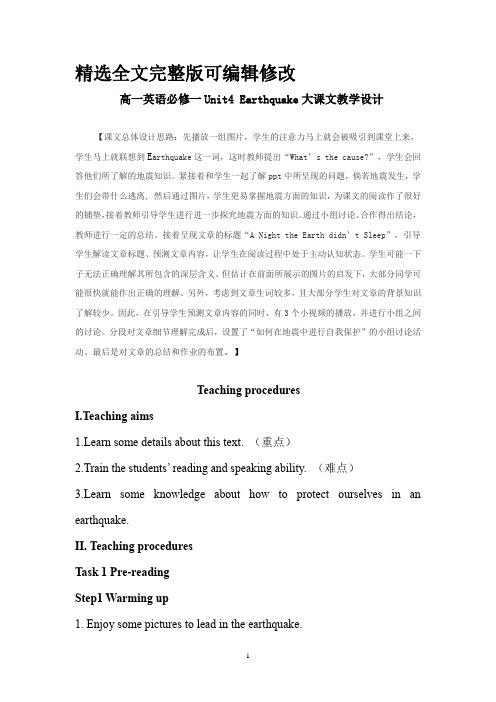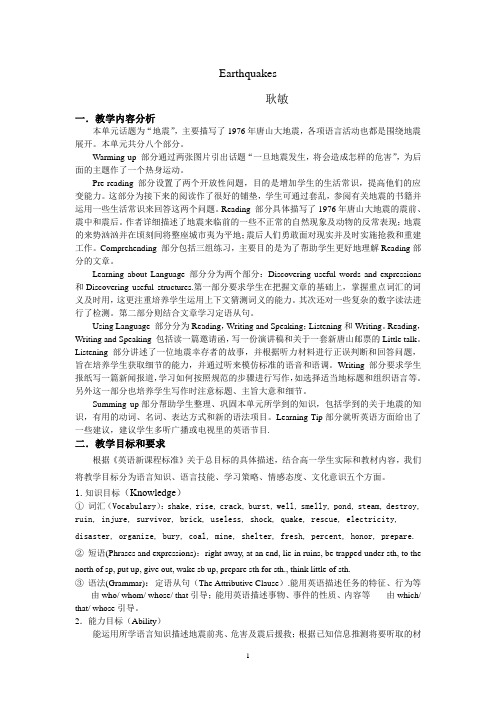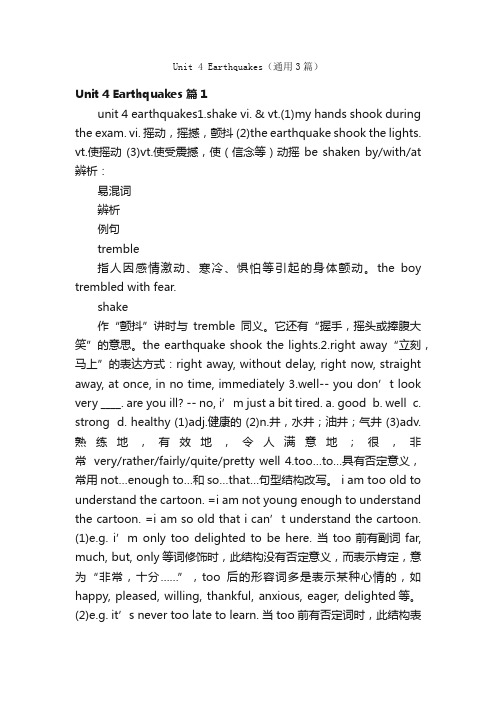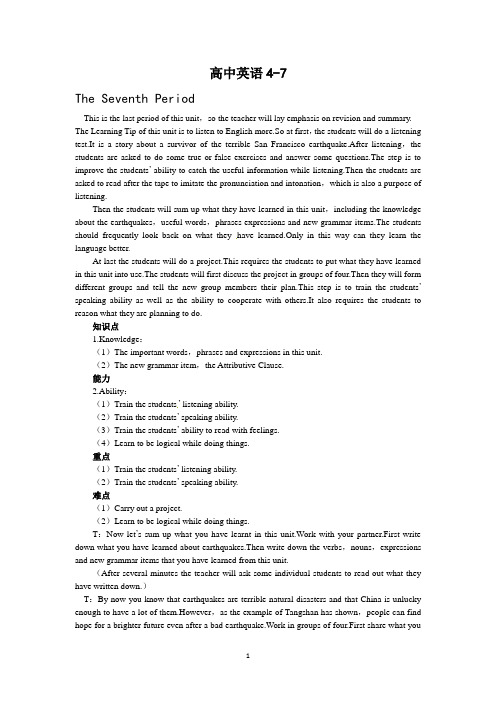2016-2017学年高中英语 Unit 4 Earthquakes单元综合检测
高中英语Unit4Earthquakes单元整合全省一等奖公开课PPT

earthquake quake well pipe burst nation canal stream dirt
ruin suffering extreme injure destroy
brick dam track useless shock rescue trap electricity disaster 词汇
Tangshan.
The number of the people who were killed or injured reached more than 400,000.
Can we do something to keep ourselves safe from earthquakes? Scientists have
新课标导学
英语
必修① ·人教版
Unit 4
Earthquakes
1
学习目标展示
2
背景知识链接
学习目标展示
类别
课程标准要求掌握的项目
话题 Basic knowledge about earthquakes; how to protect oneself and help others in disasters
bury mine miner shelter title reporter bar frighten frightening
frightened congratulation judge express outline headline cyclist
right away as if at an end in ruins dig out a (great) number of
Notes
1.plates n.板块
人教版高中英语必修第一册 《Unit 4:Earthquakes》教案

人教版高中英语必修第一册 《Unit 4:Earthquakes》教案一、教学目标1.知识目标o学生能够掌握与地震相关的重点词汇和短语,如 “earthquake, ruin, destroy, rescue, shock” 等。
o学生能够理解并运用描述地震现象、危害和救援的句型和表达方式。
2.技能目标o学生能够听懂有关地震的简单对话和新闻报道,获取关键信息。
o学生能够阅读并理解关于地震的文章,分析文章结构和主旨。
o学生能够用英语简单讲述地震的相关知识和个人应对地震的措施。
o学生能够写一篇关于地震预防或救援的短文,表达自己的观点和建议。
3.情感目标o培养学生对自然灾害的认识和防范意识。
o激发学生的同情心和社会责任感,关注地震受灾地区和人群。
二、教学重难点1.教学重点o重点词汇和短语的记忆与运用。
o对课文中地震相关内容的理解和语言表达的学习。
o培养学生用英语描述地震和表达应对措施的能力。
2.教学难点o如何帮助学生理解地震的复杂科学原理和巨大危害,并能用英语进行准确描述。
o引导学生在写作中清晰、有条理地阐述地震预防或救援的观点和建议。
三、教学方法1.直观演示法:通过图片、视频等展示地震的场景和数据。
2.问题引导法:以问题为导向,引导学生思考和探究。
3.讨论交流法:组织学生讨论地震相关话题,促进学生之间的思想交流。
四、教学过程(一)导入(5 分钟)1.播放一段地震的视频片段,展示地震的破坏力。
2.提问学生:What do you see in the video? How do you feel about earthquakes?(二)词汇学习(10 分钟)1.呈现本单元的重点词汇和短语,结合地震的情景进行讲解。
2.通过词汇练习,如填空、选择等,巩固学生对词汇的理解和掌握。
(三)阅读前准备(5 分钟)1.让学生观察课文标题和图片,预测文章的主要内容。
2.提出一些引导性问题,如:What might the article talk about earthquakes?(四)课文阅读(15 分钟)1.学生快速阅读课文,概括文章的主旨。
高中英语_Unit4 Earthquakes教学设计学情分析教材分析课后反思

课文标题:Reading: A Night The Earth Didn’t Sleep.单元名称:Unit 4 Earthquakes教材版本:人教版高中英语(1)必修授课年级:高一Learning Aims:1.预习并掌握一些本单元中有关地震的单词和短语, 了解地震的有关知识。
2. 通过阅读,训练阅读技能,学会用恰当的阅读方法(fast reading and close reading)来培养总结、归纳内容的能力(summarizing)。
3.学会通过找出主旨句来归纳文章与段落大意, 学习在地震或突遇的灾难中怎样自救、救人。
Teaching approaches:communicative approach, task-based approachTeaching aids:PowerPoint,blackboard, studioTeaching procedures(教学过程)Step1 Leading-in: Enjoy a vedio【设计说明】从学生感兴趣的话题导入会显得比较轻松自然,同时也能激起学生听课的兴趣。
Step2 useful words and expressions【设计说明】单词是基础,复习巩固生词为下一步阅读扫清障碍。
Step3 Fast-readingTry to get the structures of the passage main idea of the text .【设计说明】旨在锻炼学生快速搜索信息的能力。
跳读找出文章的主体大意及各段的主题,这样设计是为让学生了解、抓住本文的主题思想,为下一步细读做准备。
Step4 Careful readingPart 1 Before the earthquake: the signs【设计说明】文章较长,采取分段学习,课文层次清晰,学生自读与听力相结合,能帮助学生理解与提高听力水平,通过与搭档相互核对答案同时培养了学生合作学习的意识。
高中英语-Unit4Earthquake教学设计学情分析教材分析课后反思全文编辑修改

精选全文完整版可编辑修改高一英语必修一Unit4 Earthquake大课文教学设计【课文总体设计思路:先播放一组图片,学生的注意力马上就会被吸引到课堂上来,学生马上就联想到E arthquake这一词,这时教师提出“What’s the cause?”,学生会回答他们所了解的地震知识。
紧接着和学生一起了解ppt中所呈现的问题,倘若地震发生,学生们会带什么逃离, 然后通过图片,学生更易掌握地震方面的知识,为课文的阅读作了很好的铺垫,接着教师引导学生进行进一步探究地震方面的知识。
通过小组讨论、合作得出结论,教师进行一定的总结。
接着呈现文章的标题“A Night the Earth didn’t Sleep”,引导学生解读文章标题、预测文章内容,让学生在阅读过程中处于主动认知状态。
学生可能一下子无法正确理解其所包含的深层含义。
但估计在前面所展示的图片的启发下,大部分同学可能很快就能作出正确的理解。
另外,考虑到文章生词较多,且大部分学生对文章的背景知识了解较少。
因此,在引导学生预测文章内容的同时,有3个小视频的播放,并进行小组之间的讨论。
分段对文章细节理解完成后,设置了“如何在地震中进行自我保护”的小组讨论活动。
最后是对文章的总结和作业的布置。
】Teaching proceduresI.Teaching aims1.Learn some details about this text. (重点)2.Train the students’ reading and speaking ability. (难点)3.Learn some knowledge about how to protect ourselves in an earthquake.II. Teaching proceduresTask 1 Pre-readingStep1 Warming up1. Enjoy some pictures to lead in the earthquake.Step2 Brainstorming1.Imagine your home begins to shake and you must leave it right away.You have time to take only one thing. What will you take?I will takeTask 2 While-readingStep1 Fast reading : True or False.1.The passage mainly talks about a/an ___________(what) thathappened in _________ (where)in ______(when).2.Please divide the passage into 3 parts according to the main idea.Look at the each part and write down its main idea.Part 1: main idea:Part 2: main idea:Part 3: main idea:Step2 Careful reading1. What are the strange things before the earthquake? Read part.1 carefully and fill in the blanks.①The water in the wells____and____. And some deep ____could be seen in the well walls. A ____gas came out the cracks.②The chickens and even pigs were______nervous _____eat.③Mice ran out of the fields_____places to hide.Fish ______out of bows and ponds.④People could see ___lights in the sky. The sound of _____could beheard outside the city.The water pipes in some buildings____and_____. 2.Read part 2 and finish the exercises.②True ( T )or False( F )1.Two-thirds of the nation felt the earthquake. ( )2. All the people in Tangshan were dead or injured during the earthquake. ( )3. All of the city’s hospitals, factories, buildings and homes were damaged in the earthquake. ( )4. Not only the people but also the animals were shocked greatly.( )5. Many rescue workers and doctors were trapped under the ruins during the aftershock. ( )3.Soon after the quakesThe army:Workers:Result:nguage points1.. … the water pipes in some buildings cracked and burst.burst :(vt.vi.n)突然破裂,爆发.burst into+ n. burst out + doing……He burst into laughter.= .2. It seemed as if the world was at an end.1) as if①as if 在表语从句中相当于that:②as if 似乎, 好像= as thoughShe spoke to me as if she knew me.③as if后还可跟名词、形容词、不定式等。
高中英语 Unit4 Earthquakes综合微评 新人教版必修1

第四单元综合微评(满分:120分时间:90分钟)第一部分阅读理解(共两节,满分40分)第一节(共15小题;每小题2分,满分30分)阅读下列短文,从每题所给的四个选项(A、B、C和D)中,选出最佳选项。
AThere once was a very honest shopkeeper whose business was to provide goods to the local people.He would open his shop at 8:00 a.m.after having his breakfast and at 1:00 p.m.he would go for lunch.In the evening at 8:30 p.m.he closed his shop to complete his daily routine.However,to get time for lunch was really difficult because he didn't have anybody to help him at that time.Therefore,it was his daily practice that whichever customer was shopping at 1:00 p.m.would be asked to oversee (看管) the shop until the shopkeeper returned from lunch.One day,a group of four thieves planned to steal from his shop while he was gone for lunch.One of the thieves went at 1:00 p.m.to be the customer that would be asked to oversee the shop.The thief,pretending to be a customer,went in at 1:00 p.m.and started buying several items.As planned,the shopkeeper asked the thief to sit on his chair for thirty minutes until he returned from lunch.Then,the other three thieves quickly came and told the pretended customer to help,but something had changed within him and he knew deeply in his heart that if he was given responsibility for the shop,he should not perform any dishonest acts during that time.His friends did not agree.As the now honest man tried to stop them,they resisted (抵抗) and a fight started.And at the same time the shopkeeper returned and asked why there was a fighting.The now honest man explained the entire plan.The shopkeeper had been searching for an honest man who could take ownership of the shop and run it.The shopkeeper felt that he had found the right man.1.What is the problem for the shopkeeper?A.Nobody could prepare lunch for him every day.B.He had nobody to keep the shop when he went for lunch.C.He was too busy to have lunch every day.D.He couldn't find a person to work at the shop.2.Why did the thief go to the shop at 1:00 p.m.?A.Because he thought he would be asked to keep the shop.B.Because the shopkeeper invited him to lunch then.C.Because the shop was closed at that time.D.Because he thought he could buy cheap things then.3.When the shopkeeper returned from lunch,he found________.A.everything in his shop was stolenB.the thief became the new owner of the shopC.there was a fighting in his shopD.the thief helped his fellows steal things from his shop4.From the passage,we can infer that________.A.once a thief,he will always be a thiefB.an honest man will be responsible for his actionC.you can't believe in a dishonest man foreverD.trust can change a thief into an honest man答案:1.B 解析:由第二段的第一句话可知他吃午饭时间,无人看店。
高中英语Unit4Earthquakes测评含解析新人教版必修10516428.docx

Unit 4 Earthquakes测评(时间:120分钟满分:150分)主题语境:人与自然第一部分听力(共两节,满分30分)第一节(共5小题;每小题1.5分,满分7.5分)听下面5段对话。
每段对话后有一个小题,从题中所给的A、B、C三个选项中选出最佳选项,并标在试卷的相应位置。
听每段对话前,你都有5秒钟的时间阅读题目;听完后,各小题给出5秒钟的作答时间。
每段对话仅读一遍。
1.Where does the conversation most probably take place?A.In a park.B.In a zoo.C.In a pet store.答案:C2.What does the woman mean?A.Things here are very cheap.B.Things here are not cheap.C.She doesn’t know whether things here are cheap or not.答案:B3.Where are the two speakers going to plant the tree?A.By the front door.B.At the back of the garage.C.At the end of the garden.答案:C4.Where does the conversation take place?A.In a shop.B.In a hotel.C.In a restaurant.答案:C5.What do we learn from the conversation?A.The man went to New Zealand during Christmas.B.The man stayed at home during the holiday.C.The man’s parents live in New Zealand.答案:A第二节(共15小题;每小题1.5分,满分22.5分)听下面5段对话或独白。
17年秋高中英语Unit4EarthquakesSectionⅠWarmingUp

答案:(1)~(5)
CEBDA
2.What’s the main idea of the text? The passage mainly talks about a(n) earthquake that happened in
Tangshan in 1976 .
3. Match each paragraph with its main idea. (1)Paragraph 1 (2)Paragraphs 2~3 (3)Paragraph 4
答案:1~5
CAABC
Careful Reading
1.Read the passage carefully and join the correct parts of the sentences. (1)The chickens didn’t eat because (2)The people didn’t worry because (3)Such a great number of people died because (4)Water was needed because
2.Which of the following can also be used as a title of the text? A.Tangshan Earthquake B.The world at an end C.How to prevent an earthquake D.New Tangshan 3.The second and third paragraph are mainly about ________. A.the great loss the earthquake brought to Tangshan B.the number of people who were killed or injured C.when and where an earthquake happened D.the cause of the big earthquake in Tangshan
Unit_4_Earthquakes全单元教案

Earthquakes耿敏一.教学内容分析本单元话题为“地震”,主要描写了1976年唐山大地震,各项语言活动也都是围绕地震展开。
本单元共分八个部分。
Warming-up 部分通过两张图片引出话题“一旦地震发生,将会造成怎样的危害”,为后面的主题作了一个热身运动。
Pre-reading 部分设置了两个开放性问题,目的是增加学生的生活常识,提高他们的应变能力。
这部分为接下来的阅读作了很好的铺垫,学生可通过套乱,参阅有关地震的书籍并运用一些生活常识来回答这两个问题。
Reading 部分具体描写了1976年唐山大地震的震前、震中和震后。
作者详细描述了地震来临前的一些不正常的自然现象及动物的反常表现;地震的来势汹汹并在顷刻间将整座城市夷为平地;震后人们勇敢面对现实并及时实施抢救和重建工作。
Comprehending 部分包括三组练习,主要目的是为了帮助学生更好地理解Reading部分的文章。
Learning about Language 部分分为两个部分:Discovering useful words and expressions 和Discovering useful structures.第一部分要求学生在把握文章的基础上,掌握重点词汇的词义及时用,这更注重培养学生运用上下文猜测词义的能力。
其次还对一些复杂的数字读法进行了检测。
第二部分则结合文章学习定语从句。
Using Language 部分分为Reading,Writing and Speaking;Listening和Writing。
Reading,Writing and Speaking 包括读一篇邀请函,写一份演讲稿和关于一套新唐山邮票的Little talk。
Listening 部分讲述了一位地震幸存者的故事,并根据听力材料进行正误判断和回答问题,旨在培养学生获取细节的能力,并通过听来模仿标准的语音和语调。
Writing部分要求学生报纸写一篇新闻报道,学习如何按照规范的步骤进行写作,如选择适当地标题和组织语言等。
高中英语Unit4Earthquakes单元小结教案新人教必修10603140.doc

Unit 4 EarthquakesTwo big buses with 89 passengers hit each other near the canal at 11:00 pm yesterday,one of which was nearly in ruins. It shocked the whole nation. As is reported, 32 people lost their lives and a number of people got injured, and some of them were trapped in the other bus waiting for rescue. Almost all people who survived got extreme suffering. On hearing the disaster, the rescue team arrived at the spot right away to dig out survivors, most of them were frightened to think of the frightening event. Judging from the accident spot, it seemed as if one of the drivers had fallen asleep when driving, which may be the major reason causing the accident.昨晚11时两辆载有89名乘客的大客车在运河附近相撞,其中一辆车几乎全部撞毁。
此事一发生即震惊全国。
据报道,32人死亡,另有多人受伤,其中部分人被困在另一辆车里等待救援。
几乎所有幸存下来的人都极度痛苦。
一听到灾难的消息,救援队立刻赶到现场搜救幸存者。
大部分人回想起这件可怕的事情都惊恐万分。
Unit4Earthquakes(通用3篇)

Unit 4 Earthquakes(通用3篇)Unit 4 Earthquakes 篇1unit 4 earthquakes1.shake vi. & vt.(1)my hands shook during the exam. vi. 摇动,摇撼,颤抖 (2)the earthquake shook the lights. vt.使摇动 (3)vt.使受震撼,使(信念等)动摇 be shaken by/with/at 辨析:易混词辨析例句tremble指人因感情激动、寒冷、惧怕等引起的身体颤动。
the boy trembled with fear.shake作“颤抖”讲时与tremble同义。
它还有“握手,摇头或捧腹大笑”的意思。
the earthquake shook the lights.2.right away“立刻,马上”的表达方式:right away, without delay, right now, straight away, at once, in no time, immediately 3.well-- you don’t look very ____. are you ill? -- no, i’m just a bit tired. a. good b. well c. strong d. healthy (1)adj.健康的 (2)n.井,水井;油井;气井 (3)adv.熟练地,有效地,令人满意地;很,非常very/rather/fairly/quite/pretty well 4.too…to…具有否定意义,常用not…enough to…和so…that…句型结构改写。
i am too old to understand the cartoon. =i am not young enough to understand the cartoon. =i am so old that i can’t understand the cartoon.(1)e.g. i’m only too delighted to be here. 当too前有副词far, much, but, only等词修饰时,此结构没有否定意义,而表示肯定,意为“非常,十分……”,too后的形容词多是表示某种心情的,如happy, pleased, willing, thankful, anxious, eager, delighted等。
高中英语同步单元复习 Unit4 Earthquakes(教师版)

一、单词部分:重点单词:1. burst (vi. 爆裂;爆发)2. injure (vt.损害;伤害)3. destroy (vt. 破坏;毁坏)4. shock (v. 震动;震惊)5. rescue ( v. 救援;营救)6. disaster (n. 灾难;灾祸)7. trap (v. 使陷入困境) 8. bury (v. 埋葬;掩埋) 9. judge (n.裁判员;法官)10. congratula tion (n. 祝贺) 11. sincerely (adv. 真诚地) 12. express(v. 表示;表达)识记单词:1. earthquake (n. 地震)2. event ( n. 事件;大事)3. electricity (n. 电;电学)4. reporter (n.记者 )5. frighten (v. 吓唬;使惊吓)6. million (n.百万)7. extreme (adj. 极度的) 8. damage (n./vt. 损害;损失) 9. headline (n.报刊的大字标题)二、短语填空1. right away 立刻;马上2. as if 好像3. at the end 结束;终结4. in ruins 成为废墟5. dig out 掘出;发现6. think little of 评价不高/轻视7. a (great) number of 许多的;大量的 8. as usual 像往常一样9. be proud of 以----自豪 10. be buried in/bury oneself in 专心于;埋头于三、重点句型1.All hope was not lost.该句为部分否定。
all, both, everyone, everybody, everything以及“every+名词”都表示全部肯定;no one, none, nobody, nothing, not … any, 以“no+名词”及都表示全部否定;但当not出现在含有表示全部肯定的不定代词的句子中,不管 not 在它们之前或之后都表示部分否定。
高考英语 经典实用 Unit 4 Earthquakes要点梳理+重点突破 新人教版必修1

高考英语经典实用 Unit 4 Earthquakes要点梳理+重点突破新人教版必修1要点梳理高效梳理·知识备考●重点单词1.burst vi.爆裂;爆发 n.突然破裂,爆发2.event n.事件;大事3.nation n.民族;国家;国民→national adj.国家的,民族的→nationality n.国籍4.ruin n.废墟;毁灭 vt.毁灭;使破产5.suffering n.苦难;痛苦→suffer v.受苦,遭受6.extreme adj.极度的→extremely adv.7.injure vt.损害;伤害→injured adj.受伤的→injury n.伤害,损害8.destroy vt.破坏;毁坏;消灭9.useless adj.无用的;无效的;无益的→useful(反义词)→use v. & n.使用,利用10.shock vt. & vi.(使)震惊;震动 n.休克;打击;震惊11.rescue n. & vt.援救;营救12.trap vt.使陷入困境 n.陷阱;困境13.electricity n.电;电流;电学→electric adj.用电的;带电的;发电的→electrical adj.与电有关的;电学的14.disaster n.灾难;灾祸15.bury vt.埋葬;掩埋;隐藏16.shelter n.掩蔽;掩蔽处;避身处17.damage n. & vt.损失;损害18.frighten vt.使惊吓;吓唬→frightened adj.受惊的;受恐吓的→frightening adj.令人恐惧的19.judge n.裁判员;法官 vt.断定;判断;判决→judgement n.判断,判决20.express vt.表示;表达n.快车;速递→expression n.表达→expressive adj.有表现力的●重点短语1.right away立刻2.at an end 结束3.in ruins成为废墟4.dig out掘出;发现5.a(great) number of 许多;大量的6.give out分发;发出(气味、热等)7.thousands of成千上万8.think little of 不重视;不假思索9.blow away吹走;刮走10.be proud of以……而自豪11.instead of代替12.be trapped in陷入……之中13.be known for/as因为/作为……出名14.bring in引进;引来●重点句型1.In the farmyards, the chickens and even the pigs were too nervous to eat. 在农家院子里,鸡和猪都烦躁不安,以致不吃食。
高中英语(Unit4 Earthquakes the 7th period)

高中英语4-7The Seventh PeriodThis is the last period of this unit,so the teacher will lay emphasis on revision and summary. The Learning Tip of this unit is to listen to English more.So at first,the students will do a listening test.It is a story about a survivor of the terrible San Francisco earthquake.After listening,the students are asked to do some true-or-false exercises and answer some questions.The step is to improve the students’ ability to catch the useful information while listening.Then the students are asked to read after the tape to imitate the pronunciation and intonation,which is also a purpose of listening.Then the students will sum up what they have learned in this unit,including the knowledge about the earthquakes,useful words,phrases expressions and new grammar items.The students should frequently look back on what they have learned.Only in this way can they learn the language better.At last the students will do a project.This requires the students to put what they have learned in this unit into use.The students will first discuss the project in groups of four.Then they will form different groups and tell the new group members their plan.This step is to train the students’speaking ability as well as the ability to cooperate with others.It also requires the students to reason what they are planning to do.知识点1.Knowledge:(1)The important words,phrases and expressions in this unit.(2)The new grammar item,the Attributive Clause.能力2.Ability:(1)Train the students’ listening ability.(2)Train the students’ speaking ability.(3)Train the students’ ability to read with feelings.(4)Learn to be logical while doing things.重点(1)Train the students’ listening ability.(2)Train the students’ speaking ability.难点(1)Carry out a project.(2)Learn to be logical while doing things.T:Now let’s sum up what you have learnt in this unit.Work with your partner.First write down what you have learned about earthquakes.Then write down the verbs,nouns,expressions and new grammar items that you have learned from this unit.(After several minutes the teacher will ask some individual students to read out what they have written down.)T:By now you know that earthquakes are terrible natural disasters and that China is unlucky enough to have a lot of them.However,as the example of Tangshan has shown,people can find hope for a brighter future even after a bad earthquake.Work in groups of four.First share what youhave learned about earthquakes with your group members.(Ss work in groups.)T:Now imagine that your group lives in a city that has been hit by an earthquake.Your group is given the job to build a new city.Make a list of things that need to be done.Decide what things must be done first and what things can be done later.The list of things on Page 68 should be considered.Maybe you will have different opinions with other group members.Remember to give reasons for what you have chosen.(Ss discuss in groups,while the teacher gets around the classroom and helps the students deal with any difficulties they may have.)T:From your group’s list,choose one thing that you consider to be the most important and write down your reasons.(After several minutes.)T:Now we will make different groups.Number every member of your group from 1 to 4.All the students with No.1 go to one group,and all the students with No.2 go to the same group and the same with students with No.3 and No.4.(After the students have formed new groups.)T:Tell your new group members the thing that you have chosen and the reasons.Then each group should make a list of three most important things.(After several minutes the teacher checks the students’ answers.)(The answers can be various.But each group must provide enough reasons for the things that they have chosen.)Unit 4 EarthquakeThe Seventh PeriodSumming upWrite down what you have learned about earthquakes.From this unit you have also learned·useful verbs:·useful nouns:·other expressions:·new grammar item:探究Poster-makingReport on Earthquakes:Up till now the students have learned a lot of things about earthquakes,including two terrible earthquakes both at home and abroad,the causes of earthquakes,the ways to reduce the losses of earthquakes,and how to produce an earthquake plan.So the students are asked to make a report to the whole class about these earthquake-related things.1.Work in groups of five or six.List the things they want to mention.2.Each student of the group writes one aspect of earthquakes.bine what they have written into a passage,adding necessary words or phrases.4.Each group chooses one representative to present the report to the whole class.5.Choose the best reporter and the best group.资料 A Circus DisasterJuly 6,1944,was a day of nightmare(噩梦)that I will never forget.That afternoon when I was making up my face in a dressing tent at the moment,I suddenly heard someone run past shouting “Fir e! ”Fire was what we circus(马戏团)people most feared for there was a large audience in the tent,including many children.I rushed towards the tent with a bucket but I could do nothing with it since the tent was burning too high and the flames spreading quickly.In the burning tent was a scene of panic(恐慌):people rushed towards the exits,and some even jumped twelve feet from the top rows of the grandstand to the ground outside.Some people,after getting out,tried to re-enter to help their relatives or friends.Yet it was impossible for them to get through the crowd;instead,they blocked the way,I fought at o ne exit,shouting at the top of my lungs.“Go on! Keep moving!”At every exit,circus people were doing the same thing.In the midst of this scene,the musicians kept on playing until the tent was a fire overhead.City fire equipment finally arrived and put out the fire.All the circus people were safe though some were bruised(撞伤)or burned during the rescue work.The audience,however,were not that lucky.In a panic,they all tried to use the regular exits through which they had entered the rent.As a result,168 people had died in the fire ─the worst circus disaster in history.。
必修一4 Unit4 Earthquakes

【导学练过程】:I.基础知识课前自查一.单词巧记1.(n.)地震→(同义词)(n.)地震2.(vi.)爆裂;爆发;(n.)突然破裂;爆发→(过去式)→(过去分词)3.(n.)事件;大事4.(n.)民族;国家;国民→(adj.)民族的;国家的5.(n.)废墟;毁灭;(vt.)毁灭;使破产6.(adj.)极度的→(adv.)极度地7.(vt.)损害;伤害→(n.)损害;伤害8.(vt.)毁坏→(n.)破坏,毁灭9.(adj.)无用的;无效的;无益的→(反义词)有用的→(n.)用途;(vt.)使用10.(vt.& vi.)(使)震惊;震动;(n.)休克;打击;震惊→(adj.)令人震惊的→(adj.)感到震惊的11.vt.使惊吓;吓唬→adj.受惊的;受恐吓的→adj.令人恐惧的12.n.祝贺;(复数)贺词→v.祝贺13.v.判断;断定;判决;n.裁判员,法官→n.判断14.vt.表示;表达;n.快车;速递→n.表达,表情15.adv.真诚地;真挚地→adj.真诚的二.短语英汉互译1.right away2.as if3.at an end4.in ruins5.dig out6.a (great)number of7.judge by/from8.come out of9. 突然大哭____ ____10. 为了纪念… ___ ___ 11. 对…高度评价_____ _ 12.爆发____ _13. 被困在下面________ 14. 很高兴做… ___ __三.句子英汉汉英互译1. In fifteen terrible seconds a large city lay in ruins.2.似乎世界末日来临了。
3.Your speech was heard by a group of five judges, all of whom agreed it was the best one this year. 4.她待他如陌生人,这让他很伤心。
高中英语Unit4Earthquakesdocdoc同步单元进阶1试题

单元进阶(四)制卷人:歐陽文化、歐陽理複;制卷時間:二O二二年二月七日第一卷(一共105分)第一局部听力(一共两节,满分是30分)第一节(一共5小题;每一小题1.5分,满分是7.5分)听下面5段对话。
每段对话后有一个小题,从题中所给的A、B、C三个选项里面选出最正确选项。
听完每段对话后,你都有10秒钟的时间是来答复有关小题和阅读下一小题。
每段对话仅读一遍。
1.What are the speakers going to do?A.To hold a meeting.B.To prepare for cooking.C.To set a table for a meal.2.Why will the speakers have to cancel the fair?A.Because it keeps raining.B.Because the gym’s being repaired.C.Because the school hall is full of books.3.Where did the man get the news that all the flights had been canceled?A.At the airport.B.At the meeting.C.At the international flat.4.What is the relationship between the two speakers?A.Classmates.B.Friends.C.Colleagues.5.What’s the man doing now?A.Trying to have a sleep.B.Studying.C.Arguing with his wife.第二节(一共15小题;每一小题1.5分,满分是22.5分)听下面5段对话或者独白。
每段对话或者独白后有几个小题,从题中所给的A、B、C 三个选项里面选出最正确选项。
- 1、下载文档前请自行甄别文档内容的完整性,平台不提供额外的编辑、内容补充、找答案等附加服务。
- 2、"仅部分预览"的文档,不可在线预览部分如存在完整性等问题,可反馈申请退款(可完整预览的文档不适用该条件!)。
- 3、如文档侵犯您的权益,请联系客服反馈,我们会尽快为您处理(人工客服工作时间:9:00-18:30)。
单元检测(四)第一卷第一部分听力(共两节,满分30分)第一节(共5小题;每小题1.5分,满分7.5分)听下面5段对话。
每段对话后有一个小题,从题中所给的A、B、C三个选项中选出最佳选项。
听完每段对话后,你都有10秒钟的时间来回答有关小题和阅读下一小题。
每段对话仅读一遍。
1.How much does she have to pay if she buys one now?A.$5.00. B.$4.50. C.$3.50.2.Where does the conversation most probably take place?A.In a library.B.At a restaurant.C.In a bookstore.3.What do you think is the woman?A.A cook. B.A student. C.A manager.4.Where does the man prefer to live?A.In the city.B.In the country.C.Near the town.5.What conclusio n can be drawn from the man’s answer?A.He likes the brown wool.B.He doesn’t like either.C.He likes the black and white silk.第二节(共15小题;每小题1.5分,满分22.5分)听下面5段对话或独白。
每段对话或独白后有几个小题,从题中所给的A、B、C三个选项中选出最佳选项。
听每段对话或独白前,你将有时间阅读各个小题,每小题5秒钟;听完后,各小题将给出5秒钟的作答时间。
每段对话或独白读两遍。
听第6段材料,回答第6至8题。
6.Where was the man from?A.India. B.Austria. C.Australia.7.What’s the weather like in Australia during June and July?A.It’s hot and dry.B.It’s cold and rainy.C.It’s warm and rainy.8.Which month is the best time for visitors there?A.June. B.July. C.December.听第7段材料,回答第9至11题。
9.What are the two speakers talking about?A.Their holiday plans.B.Their work.C.Harry’s holiday plan.10.How may Harry and his wife travel?A.By ship. B.By train. C.By air.11.Which will cost more money?A.Travelling by sea.B.Travelling by air.C.Staying at home.听第8段材料,回答第12至14题。
12.Who is reading the card?A.Jim. B.Father. C.Mary.13.What does the dialogue tell us?A.Jim has just reached Scotland.B.Jim lives in Scotland.C.Jim has just left Scotland.14.What is on the card?A.A letter.B.Only a few words.C.Nothing.听第9段材料,回答第15至17题。
15.Where does the conversation most probably take place?A.In the street.B.At the railway station.C.In the office.16.Where does the woman want to go?A.The bus station.B.The airport.C.The railway station.17.How does the woman go there in the end?A.By bus. B.By bike. C.By taxi.听第10段材料,回答第18至20题。
18.What did Jane write on the piece of paper?A.Her name.B.Her name and address.C.Nothing.19.What did Jane throw into the sea?A.A letter.B.A bottle with a piece of paper in it.C.A piece of paper.20.Which of the following is TRUE?A.Jane often thought of the bottle.B.Jane received a bottle.C.Jane nearly forgot the bottle.第二部分英语知识运用(共两节,满分45分)第一节单项填空(共15小题;每小题1分,满分15分)从A、B、C、D四个选项中选出可以填入空白处的最佳选项。
21. He was so ________ thought that he didn’t see the tree on the road and ran into it.A.buried in B.careful with C.busy with D.serious about 22.At the sight of the ________snake,the girl was ________ and cried for help.A.frightened;frighteningB.frightening;frighteningC.frightened;frightenedD.frightening;frightened23.________ by the bad news,the poor woman couldn’t help crying at once.A.To shock B.Shocking C.Being shocked D.Shocked24.When working in the pool,they________much jewelry and donated it to the government.A.found out B.dug out C.pointed out D.gave out25.If the barrier of the earthquake-formed Tangjiashan lake ________,a big flood will be caused.A.bursts out B.bursts C.bursts into D.burst26.It is________important for you as a reporter to record everything that happens.A.exactly B.extremely C.properly D.curiously27.A number of students ________ seen the film.That is,the number of the students who ________ seen the film______large.A.have;has;is B.has;has;areC.has;have;is D.have;have;is28.A kind of electronic equipment,______ MP6,is popular with young people now.A.known as B.knowing as C.know as D.known for29.It’s really unbelievable!Can you ______ her swimming across the English Channel?A.believe B.imagine C.mind D.think30.The company had about 20 notebook computers but only one-third ______ used regularly.Now we have 60 working all day long.A.is B.are C.was D.were31.The boy still remembers the accident exactly as if it ________yesterday.A.was happening B.happensC.has happened D.happened32.________ he could answer,hundreds of bricks fell on him and he was killed.A.Before B.Until C.Though D.As soon as33.We hope that the war will soon be ______.A.by the end B.in the end C.at the end D.at an end34.My cousin came to see me from the country,________ me a full basket of fresh fruits.A.brought B.bringing C.to bring D.had brought35.The two sportsmen congratulated each other ________ winning the match by shaking hands.A.with B.on C.in D.to第二节完形填空(共20小题;每小题1.5分,满分30分)阅读下面短文,掌握其大意,然后从36~55各题所给的四个选项(A、B、C和D)中,选出最佳选项。
There are many kinds of friends.Some are always __36__ you,but don’t understand you.Some say only a few words to you,but understand you.Many people will step in your life,but only __37__ friends leave footprints (脚印).I shall always recall (回忆) the autumn and the girl with the __38__.She will always bring back the friendship between us.I know she will always be my best friend.It was the golden season.I could see the yellow leaves __39__ in the cool __40__.In such a season,I liked walking alone in the leaves,__41__ to the sound of them.Autumn is a __42__ season and life is uninteresting.The free days always get me __43__.But one day,the sound of a violin __44__ into my ears like a stream (小溪) flowing in the mountains.I was so surprised that I jumped to see what it was.A young girl,standing in the wind,was __45__ in playing her violin.I had __46__ seen her before.The music was so nice that I listened quietly.Lost in the music,I didn’t k now that I had been __47__ there for so long but my existence (存在) did not seem to disturb her.Leaves were still falling.Every day she played the violin in the corner of the building __48__ I went downstairs to watch her performance.I was the only listener.The autumn seemed no longer lonely and life became __49__.__50__ we didn’t know each other,I thought we were already good friends.I believed she also loved me.Autumn was nearly over.One day,when I was listening carefully,the sound suddenly __51__.To my astonishment (惊讶),the girl came over to me.“You must like violin,” she said.“Yes.And you play very well.Why did you stop?” I asked.Suddenly,a __52__ expression appeared on her face and I could feel something unusual.“I came here to see my grandmother,but now I must leave.I once played very badly.It was your listening every day that __53__ me.” she said.“In fact,it was your playing __54__ gave me a meaningful autumn,” I answered,“Let’s be friends.”The girl smiled,and so did I.I never heard her play again in my life.I no longer went downstairs to listen like before.Only thick leaves were left behind.But I will always remember the fine figure (身影) of the girl.She is like a __55__—so short,so bright,like a shooting star giving off so much light that it makes the autumn beautiful.36.A.with B.for C.against D.to37.A.good B.true C.new D.old38.A.sound B.song C.play D.violin39.A.shaking B.hanging C.falling D.floating40.A.wind B.snow C.air D.rain41.A.watching B.listening C.seeing D.hearing42.A.lively B.lovely C.harvest D.lonely43.A.up B.off C.down D.over44.A.flowed B.grew C.entered D.ran45.A.lost B.active C.busy D.interested46.A.once B.never C.often D.usually47.A.waiting B.stopping C.standing D.hearing48.A.because B.so C.when D.but49.A.interesting B.moving C.encouraging D.exciting 50.A.But B.However C.Even D.Though51.A.stopped B.began C.gone D.changed52.A.happy B.sad C.strange D.surprised53.A.surprised B.excited C.encouraged D.interested54.A.that B.which C.it D.who55.A.song B.dream C.fire D.sister第三部分阅读理解(共两节,满分40分)第一节(共15小题;每小题2分,满分30分)阅读下列短文,从每题所给的四个选项(A、B、C和D)中,选出最佳选项。
